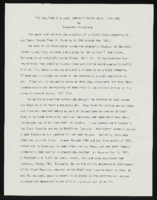Search the Special Collections and Archives Portal
Search Results

Transcript of interview with Jack W. Zunino by Stefani Evans and Claytee White, August 30, 2016
Date
Archival Collection
Description
Landscape architect Jack W. Zunino is a Fellow of the American Society of Landscape Architects (ASLA) and president of the Society's local chapter. He has designed many of Southern Nevada's iconic landscapes: the Rio Hotel, the M Resort, the Desert Demonstration Gardens, the gardens at Ethel M. Chocolates, the Cactus Avenue overpass, and most notably, the Springs Preserve. He's also a third-generation Nevadan from Elko, grandson of Italian immigrants who met and married in the Silver State and raised their large family in that Nevada mining town. The product of Elko schools, he graduated from the University of Utah in psychology and Utah State University in landscape architecture while earning his tuition as a road construction laborer. In this interview, Zunino tells of his employment with G.C. Wallace Engineering and JMA architects before founding his own landscape architecture firm in 1989. He speaks to the importance of planners and landscape architects on Southern Nevada's conser
Text

Fernando Romero oral history interview: transcript
Date
Archival Collection
Description
Oral history interview with Fernando Romero conducted by Laurents Bañuelos-Benitez on October 2, 2018 for the Latinx Voices of Southern Nevada Oral History Project. Barbara Tabach also participates in the questioning. Fernando Romero was born in El Paso, Texas in a musical home. His father and brother were avid music players, and his brother left El Paso to play in orchestra in Las Vegas. Despite not being as passionate about music as the rest of his family, music was Romero's ticket to higher education. Romero attended University of Nevada South before it was renamed University of Nevada Las Vegas. Romero has gone on to be deeply involved in the Las Vegas community. He is the current president of Hispanics in Politics. Subjects discussed in this interview include: Hispanics in Politics, Nevada Association of Latin Americans, and education.
Text

Transcript of interview with Beth Molasky by David Shwartz, June 2, 2014
Date
Archival Collection
Description
In this interview, Molasky discusses her parents, Irwin and Susan Molasky, and growing up in Las Vegas as a member of Temple Beth Sholom. She attended Sunday school and Hebrew school, but is not particularly religious as an adult.
Beth Molasky-Cornell is a partner, shareholder, and an active member of the board of directors of the Molasky Group of Companies, which was founded by her father Irwin Molasky. She is a founding partner and a core member of the board of directors of Ocean Pacific Companies, a high-end real estate development firm founded by her husband Ken Cornell in San Diego, California. Molasky-Cornell contributed to numerous Molasky Group building projects, including the Bank of America Plazas, the Winterwood Corporation land development, and the Park Towers luxury condominiums. Molasky was born in Florida; however, her family moved to Las Vegas before her second birthday. She graduated from Valley High School in 1968, and started college at the University of Southern California at the age of seventeen. After spending a couple of years in Rhode Island, where she had her children, she moved back to Las Vegas in 1975. In this interview, Molasky discusses her childhood experiences in Las Vegas, especially as a member of the Jewish community, and reflects upon changes that influenced her children?s upbringing in the city.
Text

Andre King oral history interview: transcript
Date
Archival Collection
Description
Oral history interview with Andre "Brother Dre" King conducted by Claytee D. White on July 20, 2018 for the Remembering 1 October Oral History Project. In this interview, King recalls learning judo and wrestling at an early age. After spending ten years in prison for a burglary offense, he served an additional eleven years in facilities across the state. After twenty-one years in the system, King is now a nondenominational spiritual being and once he learned about the Healing Garden for 1 October victims, he went there daily, during and immediately after the construction. King has helped many survivors and has healed himself as well, through giving love, hugs, and spiritual inspiration.
Text
Bob Paluzzi Panoramic Photographs
Identifier
Abstract
The Bob Paluzzi Panoramic Photographs (1978-2005) contain the work of photographer Robert "Bob" Paluzzi. Paluzzi began documenting local events and locations in Las Vegas, Nevada during the mid-1970s and continued photographing locations across the United States and internationally until 2005. The collection contains original photographic negatives (black-and-white and color) and photographic prints that depict sporting events and places throughout Las Vegas and the surrounding region. Additional locations include cities across the United States, and international locations including Paris, France; Brussels, Belgium; and London, England. A number of the images are from major sporting events that took place outside Las Vegas, such as Super Bowls XIV to XXXIX and Major League Baseball World Series games.
Archival Collection
University of Nevada, Las Vegas Creative Services Records (2010s)
Identifier
Abstract
This is part 5 of 6 finding aids for the University of Nevada, Las Vegas Creative Services Records and represents 2010 to 2016. Generally, materials are transferred from UNLV Photo Services to UNLV Special Collections and Archives 5 years after they are created. For materials within the last 5 years, contact photo@unlv.edu or call 702-895-3036. This finding aid contains the contact sheets and digital files produced by the University of Nevada, Las Vegas from 2010 to 2016 as an official record of the institution's development, activities, and community. Clients include UNLV colleges and departments, the University's administration, the UNLV Foundation, athletic departments, and the Nevada System of Higher Education (NSHE). Images include academic activities, athletic events, faculty and administration, student life, campus life, campus development, architecture, and public relations.
Archival Collection
Maurine and Fred Wilson and William S. Park Audiovisual Collection
Identifier
Abstract
The Maurine and Fred Wilson and Dr. William S. Park Audiovisual Collection (approximately 1900s-1970s) consist of audiovisual material created by the Wilson and Park families. The materials depict the Park homes in Las Vegas, Nevada; Park and Wilson family members; outdoor activities and vacation trips to California, Colorado, and Mexico. The collection also documents early views of the Kiel Ranch in Las Vegas, Nevada, community parades and events, and early views of Las Vegas in the 1920s.
Archival Collection
Dunes Hotel and Casino Records
Identifier
Abstract
The Dunes Hotel and Casino Records are comprised of administrative, publicity, and entertainment materials documenting the history of the Dunes Hotel and Casino in Las Vegas, Nevada from the years 1954 to 1992. Included are correspondence, contracts, photographs, hotel budgets, and an early aerial photograph of the property. The material provides a significant amount of historical documentation of the hotel that was long known to tourists and residents as the "the Miracle in the Desert."
Archival Collection

June Monroe and Kazuko Atomura oral history interview: transcripts
Date
Archival Collection
Description
Oral history interviews with June Monroe and Kazuko Atomura conducted by Cecilia Winchell and Stefani Evans on July 14 and July 19, 2022 for Reflections: the Las Vegas Asian American and Pacific Islander Oral History Project. In the first interview, Kazuko Atomura describes her childhood in Taiwan and Tokyo, Japan, and shares both happy and difficult mememories of that time. Atomura eventually moved to Los Angeles, California, where she reconnected with a man she previously met in Japan. She married him and together had their daughter, June Monroe, and another son while living in Corpus Christi, Texas. After difficult medical procedures involving Atomura's husband and Monroe's younger brother, Brian, the family relocated to Las Vegas, Nevada. Monroe recalls attending Las Vegas High School and Bonanza High School, and the struggle of making new friends as a young person. In the second interview, the mother and daughter discuss racism, discrimination, and identity. Kazuko Atomura recalls her many experiences with discrimination as a result of both her appearance and language barriers. June Monroe discusses how she came to be proud of her Japanese heritage, while Atomura discusses some of the community activities she has been involved in since living in Las Vegas including the Japanese Culture Club and odori dancing. Then, both Atomura and Monroe discuss Monroe's brother, Brian, who received two kidney transplants; one from Monroe's father and one from Monroe herself. Atomura talks about the shrines she has built for Brian, the experience of him being on dialysis, care taking, and his final days. Monroe shares about her activism with organ donation, being regularly involved with the Nevada Donor Network and helping to pass significant pieces of legislation within the area of organ donation.
Text

"The Evolution of a Black Community in Las Vegas: 1905-1940": manuscript draft by Roosevelt Fitzgerald
Date
Archival Collection
Description
From the Roosevelt Fitzgerald Professional Papers (MS-01082) -- Unpublished manuscripts file.
Text
